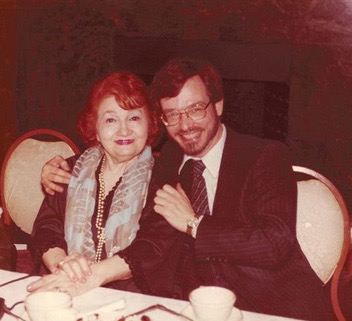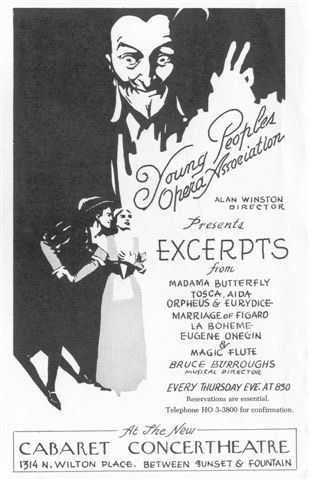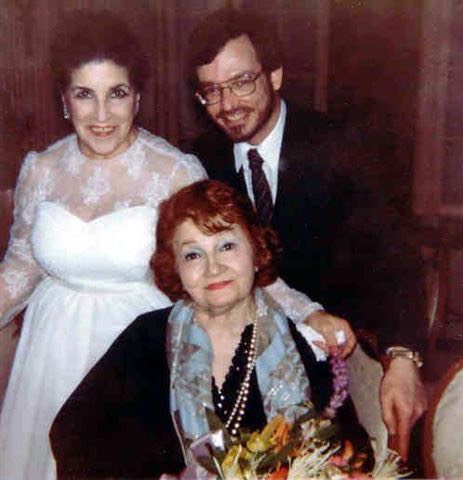
It was Christmas of my freshman year at UCLA that a splendid new reel-to-reel tape recorder entered the Burroughs household. This was an immediate incentive to begin accumulating tapes of past Metropolitan Opera broadcasts, not only to relive unforgettable ones I had myself heard in the preceding decade but also to make the acquaintance of artists who sang and performances that took place earlier—indeed, back to seasons well before I was born. My curiosity regarding the great singers of the past had always been (and remains) boundless. Among the “unknown” broadcast voices that eventually intrigued me the most was that of the Romanian soprano Stella Roman. She sang, prominently, much of Zinka’s core repertory, in fact had been the latter’s alternate in a big chunk of the standard Italian dramatic soprano canon at the Met in the 1940s (excepting Norma, which was Zinka’s private property, and Donna Anna in Don Giovanni ).
The Roman voice was a catch-all of contradictions, often annoyingly “patchwork” in the middle and lower registers, lacking in sure control and projection and unable to sustain a line there—but the top! That instrument truly loved to soar up to B-flat, B, and C and just sit. It had a combined shimmer, shine, and thrust that went far toward producing listener goose flesh, which its owner knew perfectly well, of course. Her penchant for holding onto high notes long past their decreed value was often deplored by critics but, I imagine, seldom by the paying public. I think Stella never met a high note she didn’t like. Certainly among her preserved performances to which I became privy, she seldom met one I didn’t love listening to as she poured it forth.
I was unaware she had retired to Southern California until one day in the mid-‘60s when I was scheduled to audition for a group over-emphatically labeled The Young Peoples Opera Association of Southern California and there she was, instantly recognizable among the judges (I had seen many photographs of her). By sheerest coincidence, I was slated to sing first. The pianist who was to play for the auditions never turned up, and after a long wait, with singers filling up the corridors and nothing happening, I finally volunteered to do the job. This presented me with the anomaly of having to accompany myself (in arias from Nozze di Figaro and Tannhäuser), after which, with not even five minutes’ break, I played for everyone else, an undertaking that consumed the next four hours. At the end, Stella approached and extended her hand. “I am your new big fan,” she said. I left that day with not one but two positions: principal baritone and music director of the small but feisty company of young professionals. Performances took place weekly in a funky (for lack of a better description) little hall on Wilton Place just south of Sunset Boulevard in Los Angeles called the Cabaret Concertheatre [sic]. Stella attended regularly, often with her good friend Carl Princi, host of L.A.’s daily late-afternoon program “The World of Opera” on station KFAC, with which I had grown up as much as with the Met broadcasts. Carl tended to be hypercritical, but Stella (who would poke him sharply in the ribs to shush him if his pontification became too much for one of the singers) was a beneficent presence, full of post-concert compliments. She seldom imparted advice—“What can I possibly tell you, I come to enjoy”—but once in a while would whisper something to me like, “You should sing more of that” (this after a Mozart aria).

Her attendance at YPOA’s weekly
performances in the late 1960s
fostered Stella’s and my friendship,
which really blossomed later in New York
We were reunited a few years later when both were residents of New York City, to which she returned after a decade’s absence and where I moved after my time in Boston. That is where she really became “Stella” rather than “Mme Roman” and where our acquaintance deepened into a friendship that lasted, in spirit, until the end of her life. While she was still in good health and coaching repertory, we often referred singers to each other (she only felt right dealing with the female voice, and therefore sent me the men who applied to her) and from time to time we assisted unusually worthwhile ones together. She would telephone and say, “I have a very nice Aida [or Violetta or Tosca or Mimì] now, please come and let’s work with her.” One of these sessions became memorable for the wrong reasons: I was singing Amneris’ part when we were coaching a soprano on the Aida–Amneris duet, a fine soprano who was not remotely finding what Stella called “the authenticity.” Ever my advocate, she said to the woman, “Hear how he does it? He knows exactly how it should be, why don’t you sing it like him?” The lady stormed out on the spot, never to return (as we learned subsequently). At the moment itself, Stella just shrugged: “Peccato” (too bad), she said.
Stella, almost more than any singer I’ve ever known—and we all like to talk about ourselves!—had the art of the storyteller down pat. She was a raconteuse to be reckoned with, relishing both the attention she received (always rapt) and her own prowess at spinning a tale, whether describing her relief at how the elderly Giordano’s elegant, gentlemanly attempted seduction foundered on his sleep-inducing consumption of food and wine, or how difficult it was to sing Santuzza under Mascagni’s direction because the composer’s tempos for Cavalleria rusticana had slowed to a crawl in his old age. “He nearly killed us!” she declared. “He never took those funereal tempi when he was younger and could move his arms faster!” She had sung throughout Italy in the 1930s and was acquainted with Gemma Bellincioni, the first Santuzza, who told her that in his youth, the composer routinely conducted his masterpiece “like a house on fire.”
Another of Stella’s irresistible stories (and with what devilish delight she always purveyed this one!) had to do with the great and much-loved tenor Giovanni Martinelli, who was close to the end of his career when she came to the Metropolitan but was still an artistic force to be reckoned with and still, even in his late fifties, very much the roué. Onstage his virility would go its merry way, as it were, and he was quite nonchalant about it. In one particular performance—Stella never specified the opera because, I think, she couldn’t remember which one it was—tenor and soprano were locked in a longer-than-usual embrace, during which, while pressing himself against her, Martinelli became aroused. “I pushed him away. I could have slapped him, but it wasn’t the character, we were lovers! He pulled me close again, I moved away as much as I could. He just smiled at me, and through his teeth he said, ‘Scusatemi, mia donna, ma—è naturale!’”
The all-time favorite Roman anecdote, however, did not concern a famous elderly composer or a randy, aging Italian tenor, but was instead about a local meat market counterman. At any point in an evening with Stella when there was a lull in the conversation or the chat had become too staid, all anyone had to do was say, “Stella, tell ‘George the Butcher’!” We would then be off on a half-hour saga of Stella’s experiences as a wartime diva singing at and touring with the Met during the days of coupon rationing, what she went through to get a steak (“for the strength to sing Aida”) when she hadn’t the necessary coupon, and how the relatives, friends, and acquaintances of her kind Manhattan benefactor, a butcher named George, kept turning up in greater and greater numbers and ever widening arcs of association everywhere she went, hoping she would gift them with tickets to her performances in gratitude for that steak (“Miss Roman, we are the shipmates of the son of the friend of the sister of the doctor of the neighbor of the cousin of the wife of George the butcher, and we want to come hear you tonight….”).
In her seventies Stella suffered a botched foot operation in which a nerve was severed (or permanently damaged/impaired), leaving her with a “dropped foot,” meaning that the “cure” was indeed worse than the original problem. Ever after, she had to wear a heavy, clumsy-looking boot-like shoe, and she walked, with much difficulty, using a cane. Gradually she withdrew from public activity and became unable to go out. (“Poor soul, poor soul,” Zinka often said of her after that—they had always been friendly, never personal rivals despite their shared repertory.)
I was touched when Opera News, in 1990, asked me to be the one to write the article honoring Stella on the fiftieth anniversary of her Metropolitan Opera debut. By that time I was once again only an occasional visitor to New York, and this assignment gave us the opportunity for our last, perhaps most wonderful-of-all encounters. After 1992, the year in which she died, I could no longer travel. The memories are many and tender. The nicest compliment I ever received for my singing—nicest because of the knowledge and understanding of the source— came from Stella at a party up in Pearl River, New York, to which I escorted her. It was the hostess’ requirement that no one could eat until he had “sung for his supper.” After I did so, and though she had heard me many times over the years, Stella kissed me on both cheeks and said, “Caro, la sua voce mi piace tantississimo: è oscura ma pura” (my dear, your voice pleases me so very much: it’s dark but pure). Pure, like our friendship.

Licia, Stella, and Bruce, 24 April 1983
![]()
![]()